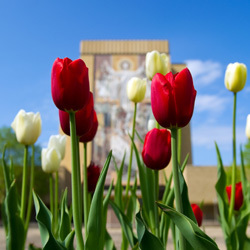

The fifth Undergraduate Library Research Award competition, with a top prize of $1,000, is accepting applications until April 10. The award is sponsored by the Hesburgh Libraries and The Center for Undergraduate Scholarly Engagement (CUSE). Last year’s top winner was Brianna Kunycky of Environmental Sciences, and other College of Science winners have come from Biochemistry and Biological Sciences.
“The purpose of this award is to recognize undergraduates who demonstrate excellent research skills and who incorporate library resources, collections and services into their scholarly and creative projects,” says Cheri Smith, program director for academic outreach and engagement and psychology librarian at the Hesburgh Libraries.
Teaching and research faculty and librarians judge submissions on their demonstration of information literacy and use of Notre Dame Library resources, including printed material, databases, manuscript collections, training opportunities, and other services, as well as the clarity of their writing, quality of their organization, depth of inquiry and, strength of argument. Information literacy involves finding, managing, applying, and correctly citing information used in the research.
“Information literacy is the ability to locate, evaluate, and ethically use information in a variety of formats, Smith says. “Recognizing that today's student researcher will produce more than the typical research paper, information literacy has evolved to include digital literacy so that it encompasses student's use and creation of a wide variety of student research output, such as films, narrative essays, academic posters, and interactive, media rich presentations. These are critical skills for success as both an undergraduate student and out in the world beyond Note Dame.”
“The Libraries wanted to reward students who conduct original research, and use a variety of library resources in the process. The program also offers inspiration to students who would like to engage in original research but are not sure how to get started. Library resources can include any of the array of expertise and services we offer, such as library instruction, research consultations, workshops, or programs such as Junior Jumpstart or Senior Thesis Camp. Previous winners have also highlighted use of physical and digital materials such as books, articles, maps, media or special collections artifacts.”
First prize for a Senior or Honors Thesis is $1,000, with a $500 prize for honorable mention in that category. Submissions from two other categories, 20000 through 40000 level classes and 10000 level classes compete for a first prize of $500 and an honorable mention of $250.
Winners will be notified later in April. Awards will be presented during the Undergraduate Scholars Conference in early May, where winners will present their winning entries as part of an oral session.
Past winners from science include:
Brianna Kunycky, 1st Prize, Senior thesis category (2013)
Title of Paper: Tragedy of the Colonial Commons: The Development of Ugandan Water Policy
Environmental Sciences
Faculty Advisor: Paul Ocobock (Arts & Letters)
Glynn Family Honors Program
Julianne Carson, First Prize 10000 Level (2012)
Title of Paper: "How Far is Too Far? Stem Cell Research & Ethics"
Biological Sciences
Advisor: Robinson Murphy (Arts & Letters)
Erin Bolte, honorable mention (2011)
Title of paper: “Review of Outcomes and Measurement Tools for Improvement in Behavior for Children with Autism Spectrum Disorder.”
Biochemistry
Faculty Advisor: Joshua Diehl.
Connor Kobeski, honorable mention (2010)
Title of paper: "Identification and Valuation of the Grand Calumet River Ecological Services."
Biological Sciences
Faculty Advisor: David Lodge.